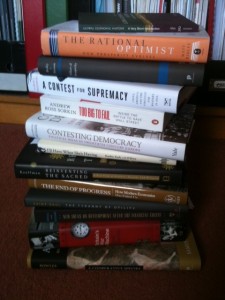Unusually for me, I have three books on the go at once. One is [amazon_link id=”0224071785″ target=”_blank” ]The Hemlock Cup[/amazon_link] by Bettany Hughes, about the life of Socrates and the character of Athens. I started it on holiday and although interesting, it’s a huge hardback so I read it in bed. Another is [amazon_link id=”1933633867″ target=”_blank” ]Debt: the first 5000 years [/amazon_link] by David Graeber, which is my on-the-go book at the moment.
The third is one I started on a plane journey and didn’t quite finish, Alberto Manguel’s [amazon_link id=”0300172087″ target=”_blank” ]A Reader on Reading[/amazon_link]. Yesterday I came across this comment in one essay about the nature of teaching, which struck me as true and worth reflecting on as we endlessly debate education policy:
“A fierce paradox exists at the heart of every school system. A society needs to impart the knowledge of its codes to its citizens so they can become active in it; but the knowledge of that code…..enables those same citizens to question that society, to uncover its evils and attempt a change. In the very system that allows a society to function lies the power to sibvert it, for better or worse.” (p161)
Teachers, he continues, are in a bind. They must teach students to think for themselves, “while teaching according to a social structure that imposes a curb on thinking.” Coincidentally, this was the bind Socrates found himself in, and the reason the Athenian court found him guilty of corrupting the city’s youth.
My friend Bethan Marshall, in her book [amazon_link id=”0415240786″ target=”_blank” ]English Teachers – The Unofficial Guide[/amazon_link], concluded that in the group she researched teachers selected themselves into categories depending on their choice about this bind. Some teach conformity but a substantial minority become ‘critical dissenters.’ Each individual chooses their relationship to their society.
Harder to resolve, though – and perhaps not capable of ever being resolved – is the political debate about what should be in the curriculum.
[amazon_image id=”0300172087″ link=”true” target=”_blank” size=”medium” ]A Reader on Reading[/amazon_image]


